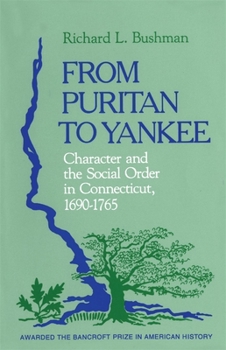From Puritan to Yankee: Character and the Social Order in Connecticut, 1690-1765
Select Format
Select Condition 
Book Overview
The years from 1690 to 1765 in America have usually been considered a waiting period before the Revolution. Richard L. Bushman, in his penetrating study of colonial Connecticut, takes another view. He shows how, during these years, economic ambition and religious ferment profoundly altered the structure of Puritan society, enlarging the bounds of liberty and inspiring resistance to established authority.
This is an investigation of the strains that accompanied the growth of liberty in an authoritarian society. Mr. Bushman traces the deterioration of Puritan social institutions and the consequences for human character. He does this by focusing on day-to-day life in Connecticut--on the farms, in the churches, and in the town meetings. Controversies within the towns over property, money, and church discipline shook the "land of steady habits," and the mounting frustration of common needs compelled those in authority, in contradiction to Puritan assumptions, to become more responsive to popular demands. In the Puritan setting these tensions were inevitably given a moral significance. Integrating social and economic interpretations, Mr. Bushman explains the Great Awakening of the 1740s as an outgrowth of the stresses placed on the Puritan character. Men, plagued with guilt for pursuing their economic ambitions and resisting their rulers, became highly susceptible to revival preaching. The Awakening gave men a new vision of the good society. The party of the converted, the "New Lights," which also absorbed people with economic discontents, put unprecedented demands on civil and ecclesiastical authorities. The resulting dissension moved Connecticut, almost unawares, toward republican attitudes and practices. Disturbed by the turmoil, many observers were, by 1765, groping toward a new theory of social order that would reconcile traditional values with their eighteenth-century experiences. Vividly written, full of illustrative detail, the manuscript of this book has been called by Oscar Handlin one of the most important works of American history in recent years.Format:Paperback
Language:English
ISBN:0674325516
ISBN13:9780674325517
Release Date:May 1980
Publisher:Harvard University Press
Length:352 Pages
Weight:0.83 lbs.
Dimensions:1.0" x 5.1" x 7.8"
Customer Reviews
2 ratings
A help for Connecticut genealogists
Published by Thriftbooks.com User , 23 years ago
This book is a wonderful addition for the amateur genealogist of Connecticut families. Many things are explained here that flesh out the "facts" gleaned from documents about various family members. I particularly found helpful the discussion on property and town formations.
Portrait of Connecticut before the Revolution
Published by Thriftbooks.com User , 25 years ago
In England, the Puritans defied church and state. In America, ironically, the Puritans established colonies which came to emphasize deference to authority. In colonial New England, a rough equality in condition eased most tensions of hierarchy in status. By the eve of the Revolution, however, several factors--religious, political, economic and demographic--worked to rekindle the Puritan tradition of agitation and radicalism. The Protestant emphasis on the authority of individual conscience was revived. Richard L. Bushman explores these developments in Connecticut, providing a colorful social portrait. He brings to life arguments and controversies, illuminating the convictions and feelings of each side. Bushman's work proves very informative and quite readable.





